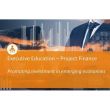Mastering the challenge of financing development projects
“My main goal to attend this online Project Finance course was to get introduced to international best practices of blended finance to foster investment into SMEs, cooperatives and farmers in order to achieve sustainable food systems and efficient agri-food chains in Georgia.” Ms. Shorena Beridze (Georgia) participant of the MSM executive Project Finance program which took place from 17 – 21 May 2021.
Leaders from around the world adopted a global 2030 development agenda at a UN Summit in September 2015. These global goals, called the Sustainable Development Goals, are ambitious and demand equal ambition in using the “billions” in Official Development Assistance to channel and crowd-in “trillions” in investments of all kinds: public and private, national and international. These goals will drive the global economic development agenda over the next 9 years. Mirjana Stanisic, lecturer International Business & Sustainable Development at MSM, designed this program to give project managers insights into the financial instruments needed to promote private investment in emerging economies.
Development Finance
The first day started with a warm welcome and brief introduction of Ms. Mirjana Stanisic, Academic Coordinator International Business & Sustainable Development at MSM. After the introduction, Mr. Paul Horrocks, Expert and trainer in Results-Based Management and Evaluation of Development Programs & Projects, took the participants into the world of development finance. They explored the opportunities and impact of blended finance and discussed the main actors in the field.
Blended Finance – part 1
On the second day, Ms. Faty Dembele, Expert Blended finance and impact investing at OECD – OCDE, introduced the participants to blended finance instruments and mechanisms. Blended finance involves the use of different financial instruments that can be used to address unwanted risk-return profiles of investment in developing countries. They learned about infrastructure-related investment risks and dived into case studies where risk mitigation instruments were used for large scale infrastructure projects.
Blended Finance – part 2
On day three of the program, Ms. Faty Dembele addressed the role of different development finance actors. Development finance actors play an important role in blended finance as they provide the commercial sector the opportunity to engage and to finance development. Furthermore, they were introduced to different finance funds and its facilities and explored some examples for the mobilization of commercial financing.
Measure and manage impact
Day four of the program dealt with the importance of impact measurement and management. Ms Priscilla Boiardi – Policy Analyst, Private Finance for Sustainable Development at OECD – shared her knowledge about the main principles, standards, frameworks and sets of indicators to measure and manage impact.
Finalizing assignment and presentation
Throughout the week, participants applied their newly gained knowledge to their individual and group assignments. All the topics addresses were brought together into a practical set of learnings, ready to be applied at work. Especially the practice-oriented part of the program was very appreciated by Ms. Shorena “The program is well-designed, based on learning-by-doing that enables us to receive practical insight along with theory discussing real-life scenarios and getting valuable feedback from lecturers. The knowledge acquired during the Project Finance program will allow me make better use of available resources and support beneficiaries to attract private finance along with donor funds to realize broader goals.”
Also Mr. Amged B. Shwehdy (Lybia) has no regrets of joining the MSM Project Finance program: “I give huge care to my career development, where I always invest in executive education and other courses to boost my journey and open new horizons for me. For that, I didn’t want the current pandemic and global lockdown to stop me, especially with the quality of the MSM courses and its good reputation, which both gave me a push to register and follow this course.”
On the question if they would encourage other professionals to join the MSM Project Finance program, Ms. Shorena commented: “If you are working at development institution and would like to learn about global trends in blended finance, this is the right course for you. All lecturers, and especially Ms. Faty, were very energetic and tried to keep the entire lecture interactive and focused on each students’ understanding and not just going through the presentation. All three lecturers were very attentive and tried to get insight on our work to match examples to our experience.”
Mr. Amged fully agrees with the words of Ms. Shorena: “Speeding all day on bluescreen is not an easy task unless you are lucky enough to have professional lecturers who can make you engage and focus. This program was interesting to me, and the lecturers did not hesitate to explain the new concepts with practical examples to make it easy for us to understand and follow up. Coming from the development sector, this course helped me to learn more about different Project Finance instruments, focusing on blended finance and the impact-oriented approaches, which helps business developers and project managers find new financing resources for their projects.”
Would you like to join the Project Finance program?
The next 5-day Project Finance program will take place from 27 September - 1 October 2021. In case you would like to join, make sure you apply before 30 August 2021.
About MSM’s executive education programs
In today’s rapidly changing world, it is important for leaders and professionals to keep their knowledge and skills up to date and relevant. Investing in executive education is investing in your future. At MSM, we embrace this lifelong learning approach! MSM’s hands-on executive programs, led by thought leaders and business experts, provide a practical and action-oriented learning experience and are designed to have an immediate impact on performance.

